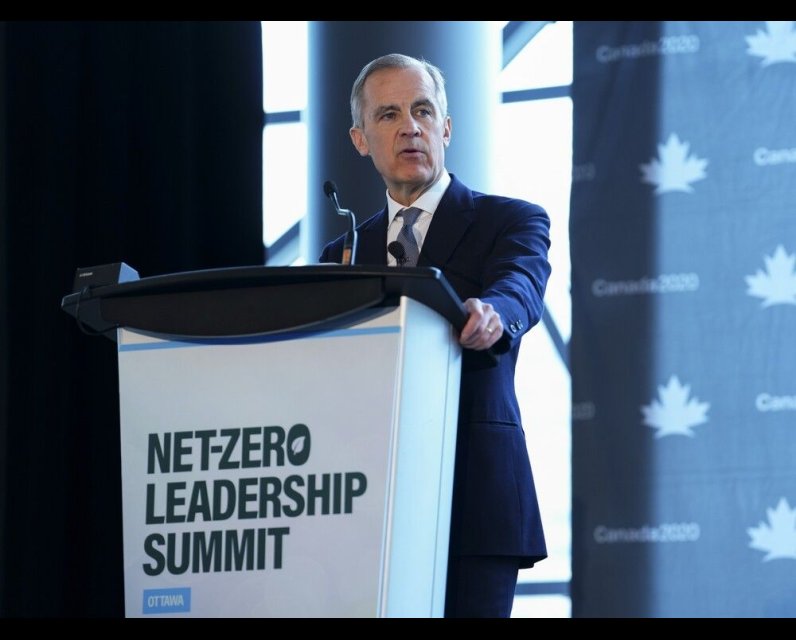'Pretend they're not there': Canada won't submit new climate targets, but won't commit to meeting them either

OTTAWA — Prime Minister Mark Carney’s government says that while it has no intention of revising its climate targets that were set under the Paris Agreement, it has also not committed to meeting them for 2030 and 2035.
It’s created a sense of uncertainty among environmental groups about what is to come from the Carney Liberals, who, for the past decade, have staked their brand on fighting climate change under the leadership of former prime minister Justin Trudeau, some of whose key policies are now being undone.
At the same time, others suggest Canada is undergoing a necessary evolution in terms of its approach to climate policy and that the country has the advantages to lead the way on clean technologies, should it so choose.
A closer look at how Carney, the two-time central banker-turned-one-time climate envoy for the United Nations, plans to balance reducing emissions while attracting private sector cash to help transform Canada into an “energy superpower” may be clearer once he unveils his promised “climate competitiveness strategy.”
Expected to be released as soon as next week, the document is not expected to be overly detailed. Rather, it is expected to highlight several parts of that strategy, including carbon pricing for industries, known by its technical name of the output-based pricing system. Clean power is expected to form another part of that strategy, with investment tax credits being another possible plank.
That still leaves the question of targets.
While Carney’s government has vowed to keep working to achieve net-zero emissions by 2050, he and his cabinet ministers have been mum on saying the same for hitting its 2030 target of reducing greenhouse gas emissions by 40 to 45 per cent below 2005 levels, and its newly set target for 2035, of reducing emissions by 45 to 50 per cent below 2005 levels.
“It’s a very awkward position to be in,” said Simon Donner, the co-chair of the government’s net-zero advisory body, as well as climate scientist and professor at the University of British Columbia.
“The government seems to be making the choice to just sort of pretend they’re not there.”
The 2030 and 2035 targets are legally binding goals set by Canada under the Paris Agreement, an international treaty adopted by many countries during a United Nations climate change conference in 2015.
Every five years, countries submit what is called a “nationally determined contribution” that forms their climate plans. The agreement itself specifies that each new target “will represent a progression beyond” a party’s existing target “and reflect its highest possible ambition.”
That means the agreement was not designed to leave room for a country to back away from its goal, Alison McDermott, a senior official at Environment and Climate Change Canada, told the parlimentary environment committee in late September.
Canada formally submitted its 2035 target back in February as the Liberal leadership race to replace Trudeau was in full swing.
“C anada does not intend to submit new targets under the Paris Agreement,” wrote Keean Nembhard, a spokesman for Environment Minister Julie Dabrusin.
“We are committed to reaching net-zero emissions by 2050 — not just because it’s important for the climate, but because we cannot ignore the reality at home.”
Nembhard added that Canada has no intention of leaving that agreement and that Canadians expect the government to tackle climate change as “one of the defining challenges of our time.”
“That’s why we’re creating the conditions for world-leading clean technology to thrive — by investing in Canadian innovation, scaling homegrown solutions, and positioning Canadian companies to lead in the global race to net-zero.”Caroline Bouillette, executive director of the Climate Action Network, which represents around 150 environmental groups from across the country, said targets serve as a “north star” for policymakers when it comes to decision-making.
She said what Carney and his environment minister have done is insert uncertainty into the situation and risked “undermining the certainty of that political signal.”
From her perspective, Bouillette said it amounts to a “soft management” of saying, “that we’re not going to meet them.”
The Canadian Climate Institute, a climate think-tank, warned back in September that Canada was not on track to meet its 2030 goal.
Bouillette and others said that while the net-zero accountability law the Liberals passed in 2021 does not oblige the government to meet its targets, it does compel them to provide progress reports.
The next update on its 2030 emissions reduction plan is due in December.
Keith Brooks, a program director at Environmental Defence, an environmental advocacy organization, said interim targets remain important to show the country is on track to meet its 2050 goal.
“We have a goal around 2050, and that’s great, but we have to have milestones along the way.”
While Carney said his forthcoming climate strategy intends to prioritize “results over objectives,” Brooks said both are needed.
For Michael Bernstein, CEO and president of Clean Prosperity, a climate policy organization focused on transitioning to a lower-carbon economy, hitting the 2030 target was always going to be a stretch.
“While the government’s new approach may face pushback from some environmental groups, he sees it as a “logical evolution.”
How much attention the public gives to the issue of climate change will ebb and flow, he said, suggesting that at the current moment, with the Canada-U.S. trade war and economic concerns top of mind, it has receded.
“What probably is the way to talk about this that is like durable throughout different economic cycles is kind of connecting climate policy and decarbonization to other key national objectives, like growing the economy, ensuring accessible and affordable energy.”
National Post
Our website is the place for the latest breaking news, exclusive scoops, longreads and provocative commentary. Please bookmark nationalpost.com and sign up for our politics newsletter, First Reading, here.


Comments
Be the first to comment